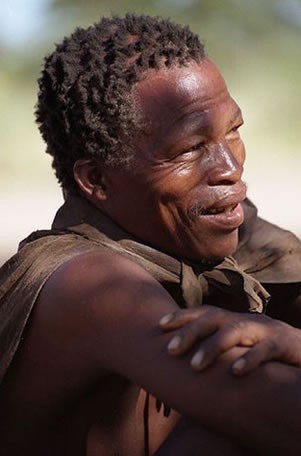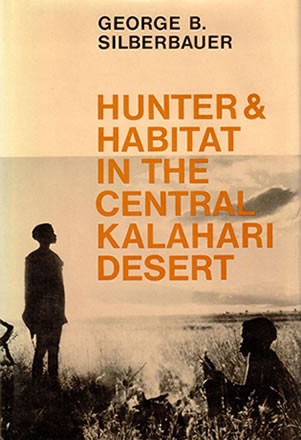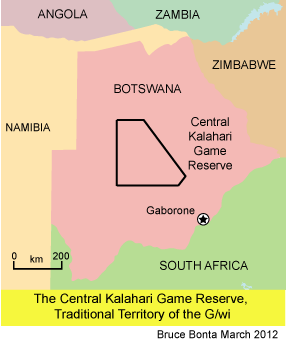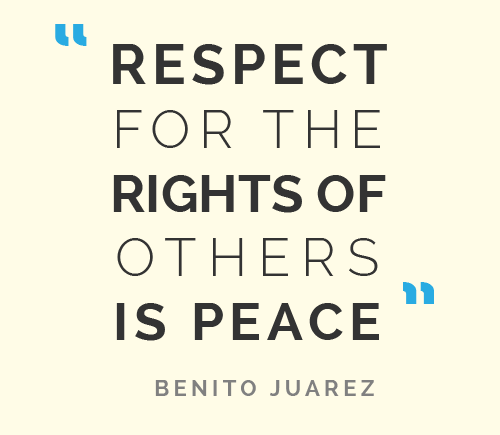Location. A San society of about 2,000 people who live in and near the Central Kalahari Game Reserve of central Botswana, in southern Africa. They are often called “Bushmen,” though that term, when applied to the indigenous people of the CKGR, may also refer to other societies.

Economy. Until recent decades they were primarily a hunting and gathering people who were highly dependent on the plants and animals of the desert. When the word went out that one band of people had plenty of food and supplies and would welcome visitors, other groups would come and pay a visit. The visitors shared in the local resources just as if they were permanent residents, and the members of the two bands mingled as close friends. Since the territories of some bands may have been stricken with drought at any given time, their sharing of resources helped ensure the survival of all the bands. These friendly visits also facilitated social interconnections and marriage ties. Furthermore, they helped inhibit competition for scarce resources.
Many news stories have been devoted to the attempts by the Botswana government to relocate the G/wi to resettlement camps away from their traditional homes in the desert, and to deprive them of water, with the intent of preventing them from possibly interfering with diamond mining.
Beliefs that Foster Peacefulness. N!adima, the supreme being of the G/wi, is the all-powerful creator of the universe and of all life, a remote, omniscient being who does not necessarily intervene to help people. G//amama, on the other hand, is a mean-spirited deity who showers irritability, misunderstanding, misfortune, and disease among humans. Geographically isolated in the Kalahari, and remote as they are from N!adima, the G/wi achieve security primarily from their own social acts. Their harmonious human relations counterbalance the loneliness of the universe. Harmony among humans is the practical result, as well as the dominating value, that the G/wi derive from their worldview. Their word for human, khwe-, implies friendliness, generosity, wisdom, calmness, and good humor. A person without these qualities, by definition, is inhuman.
Avoiding and Resolving Conflict. Conversations and gossip often allow tensions to dispel, but when conflicts become serious enough, the involved people may talk out the difficulty within the hearing of the whole band. If the problem represents a clear violation of group norms, the offender usually apologizes, though sometimes complex problems may require protracted discussions. If individuals do not heed the judgment of the group, they may be eased out. This is done, not by overt antagonism, but rather through a subtle process of frustration. The band will purposely misunderstand the wishes of the maladjusted people or pretend to not hear them—in effect reject them without causing them to feel rejected or offended. The process prompts offenders to feel disgusted with life in the band, so that they’ll leave without feeling a need for revenge.

Gender Relations. Husbands and wives are equals in G/wi society, so both are considered as equal members of the band when issues are being discussed. The young married couple will first live with the wife’s parents since he must prove his hunting ability and she must learn food gathering and other women’s duties from her parents. After the birth of the first, or sometimes even the second, child, they may move back to live with the husband’s band if they wish. Divorce occurs when differences cannot be reconciled, and the divorced partners may freely marry new spouses. In most marriages, though, couples live together in stable, cooperative and affectionate, though undemonstrative and quiet relationships.
Raising Children. G/wi babies are considered full, reasonable members of the band from birth. If the parents should leave the band with their baby for even a few days, the infant will be welcomed back by each member in turn, who will reintroduce himself or herself to the child. Children are taught by the whole group, who allow them to develop at their own pace. When children misbehave, they are allowed to sense the upset that their behavior causes and the brief, slight lessening of warmth from the others. As they become older, children will be admonished to be cooperative and gentle and told to stop the errant behavior, or someone will distract them into acceptable behavior. The only physical punishment might be a rare slap or tap.
Social Practices. When the G/wi discuss issues, they are normally quite calm, and since they are not socialized to be competitive, any idea that comes out, even from someone who is usually not a leader, will be considered and may ultimately win out. If passions during a discussion become too strong, the G/wi will back off from the topic for a while to allow emotions to cool down. A nicely presented argument may be received by a man who is suddenly very busy picking an invisible thorn from his foot, or by a woman who has decided to busy herself around her cooking fire. Decisions are reached through consensus–which is neither democratic nor necessarily unanimous, but which is reached when there is no significant opposition to a proposal.

Strategies for Avoiding Warfare and Violence. As the population in G/wi bands becomes too large for the carrying capacity of the natural resources, they find that they have to move their camp sites more and more frequently. The decrease in resources fosters an increase in conflicts, so they dissipate tensions by visiting neighboring bands more often. Soon, whole segments of a band will break off for protracted visits to other bands, thereby further relaxing tensions, and then they will finally break away and form a new band, which moves into unoccupied territory. The process of band division is accomplished in a positive fashion without hostilities or negative reactions, with people choosing the bands they wish to be part of depending on their relationships to other members of each group.
But How Much Violence Do They Really Experience? With all of his discussions of their peacefulness, George Silberbauer does not make it clear exactly how much violence the G/wi really experience. He does hint (1981, p. 174-175), however, that there is at least a low level of violence when he says that their “abhorrence of any violence that goes further than the domestic exchange of blows effectively prevents assaults.”
More Resources in this Website:
- The G/wi who have left resettlement camps in recent years and returned to desert life full-time have mixed reactions to conditions in the bush, as reports in March 2012 and December 2014 indicated.
- Threats to the G/wi from persecution by the government of Botswana—attempts to deny land, water, and hunting rights—are the subjects of many news articles in this website.
Sources in Print: Silberbauer 1972, 1981, 1982
Sources on the Web: Survival International
Updates—News and Reviews:
Selected Recent Stories
July 9, 2015. Adventures in Botswana
April 9, 2015. Searching for Life in the Kalahari
January 29, 2015. A New Blog about the G/wi
November 13, 2014. Botswana Persecutes the G/wi
All Stories
All stories in this website about the G/wi are listed in the News and Reviews Subject Listing
